
UBC Parking is investing in EV charging stations to advance UBC’s sustainability goals and provide a valuable service to drivers.
“When we opened Thunderbird Parkade for the 2010 Olympics, the development plan included installing eight electric vehicle (EV) charging stations. Those were the very first ones on campus and hardly anyone was driving EVs at the time.” Jose Jimenez stands in front of nearly a dozen electric vehicle charging stations in the newly opened University Boulevard parking lot.
Jimenez, Operations Facilities Manager with Parking and Access Services, explains that in the past nine years there has been a giant surge in demand for EV charging stations at the UBC Vancouver campus. In 2017, the university installed 10 more stations, five each in the North Parkade and West Parkade. In 2018, 40 additional EV charging stations were installed to meet growing demand in four other parkades.
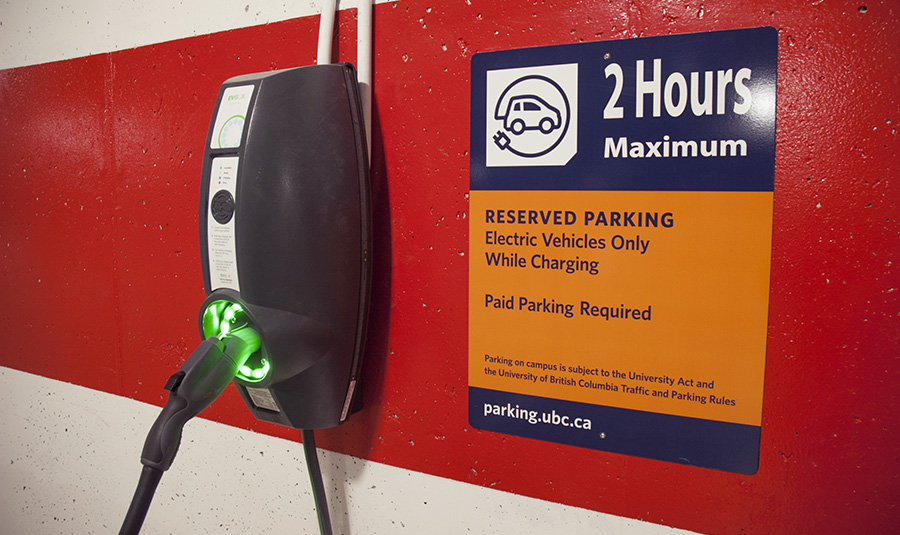
An EV charging station in the University Boulevard parking lot.
Located behind the Alumni Centre and underneath the future MacInnes Field, the recently opened University Boulevard parking lot provides short-term parking for visitors to the University Boulevard precinct including the Alumni Centre, AMS Student Nest and the UBC Aquatic Centre. A total of 16 charging stations were installed in the new parking lot bringing the campus-wide total of EV charging stations to 74.
By comparison, the City of Vancouver currently manages 75 “level 2” public EV charging stations. It’s estimated that another 175 charging points are available to EV drivers in Vancouver that are managed by parking garages, hotels, shopping malls, and other services. By 2021, a DC Fast Charging hub will be located within a 10-minute drive of anywhere in Vancouver.
“The fact that UBC is providing as many chargers as the City of Vancouver on just its Vancouver campus is amazing. UBC is doing what we can to support sustainable transportation and help the campus and the region meet their transportation and emission targets” said Krista Falkner, Transportation Engineer at Campus and Community Planning.
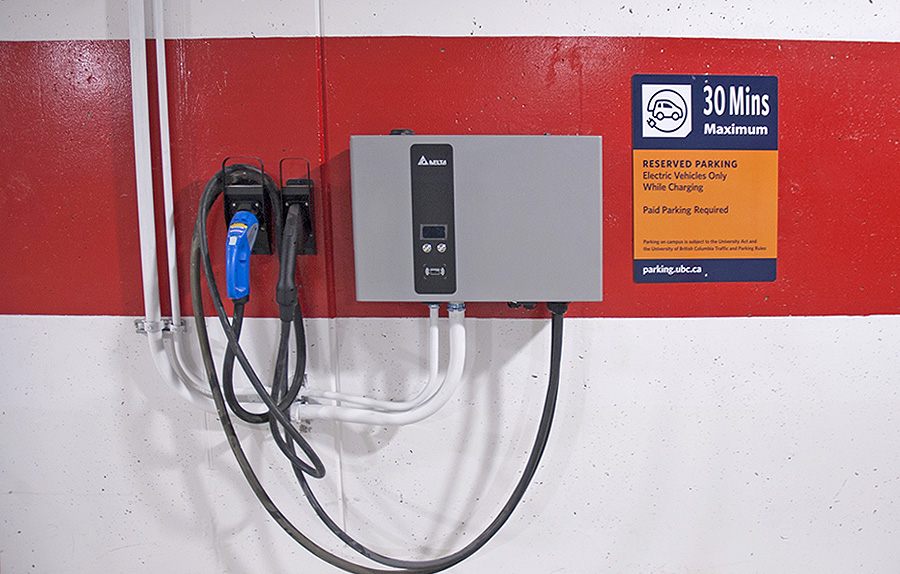
A new DC fast charger station in the University Boulevard parking lot.
Fast chargers
There are 12 level 2 chargers and four DC fast chargers installed in the University Boulevard lot.
“The fast charger name is a misnomer,” says Jimenez. “The EV chargers started with level 1, then level 2, and the latest versions are level 3 and DC fast chargers. The main difference is that level 3 chargers can charge a vehicle in 20 to 30 minutes. DC fast chargers take a little more time but the units are less expensive to install.”
Earlier versions of level 3 EV charging stations cost $120,000 to install. The new DC fast chargers cost a fraction of the cost at $20,000. “It’s a huge difference in price for a slight difference in charging time,” said Jimenez.
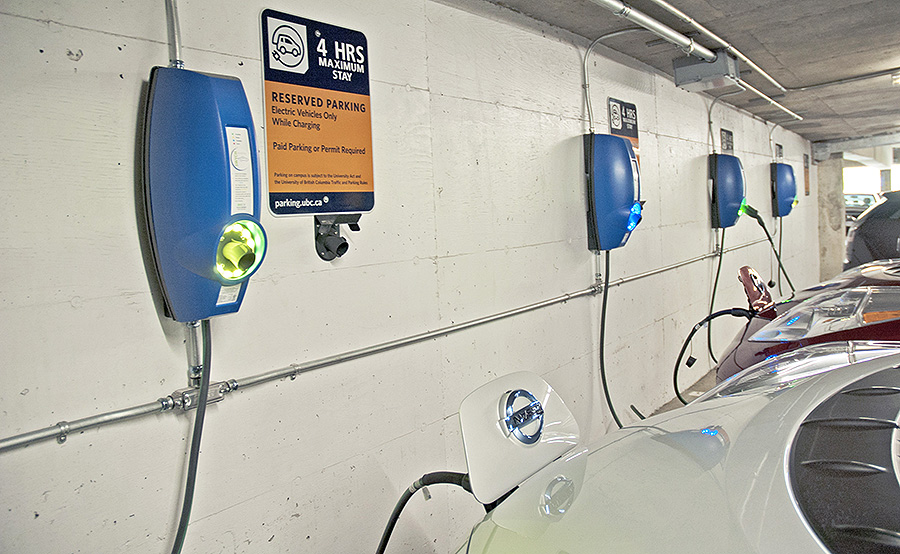
EV charging stations in the Health Sciences parkade.
Charge it and move on
“This place is always full” says Jimenez pointing to the EV charging stations in the Health Sciences Parkade. However, not all the cars are showing a red light to indicate they are being charged. “We find that most vehicles charge for about 2.5 hours and the rest of the time they sit idle” he said. This explains why a four-hour time limit was placed on the EV charging stations to encourage people to move their cars once charged.
“On an eight-hour cycle with a four-hour time limit we’d ideally like to get three sets of vehicles to use each charging station. He points to one car which has overstayed and has a parking ticket tucked under a windshield wiper. “We want to avoid people parking in the spot for the whole day. It’s a courtesy to leave the stall open for someone who actually needs the charge,” said Jimenez.
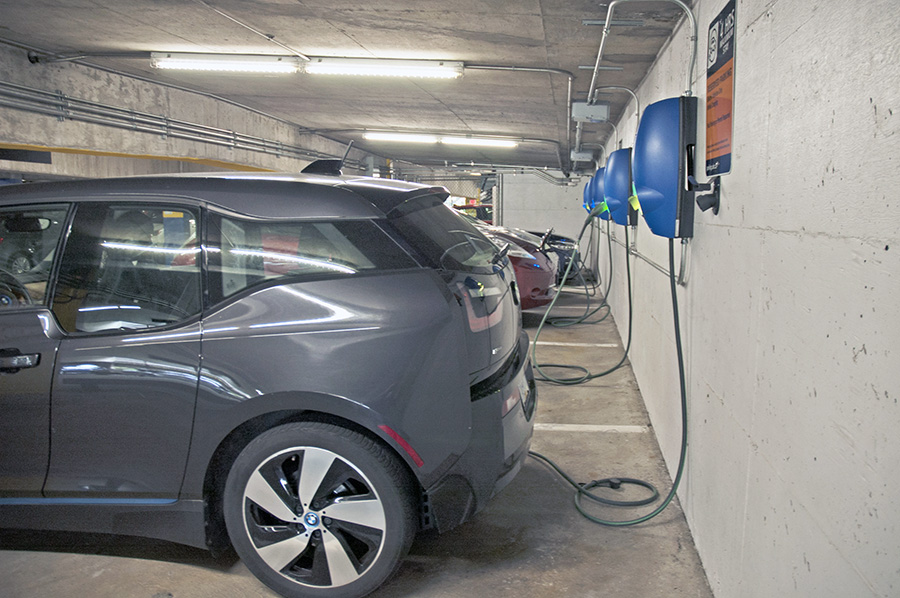
A line of cars fill the EV charging stations in the Health Sciences Parkade.
Demand for EV’s will increase
“I think it’s awesome for the university to push the envelope by installing charging stations” said Jimenez. “We understand for some people this is the only place they have to charge their vehicles until the city implements their plan.”
“Today we are seeing first generation EV’s. But 5-7 years from now these will be second hand vehicles and people who can’t afford to buy a brand-new EV will probably buy a used one.”
Parking and Access Services is planning for increasing demand and is looking to install EV charging stations in other areas around campus such as the Acadia Park neighbourhood. They are currently working with Student Housing and Hospitality Services to find an appropriate site to install 10 charging stations to be available for residents as well as the public. “We are preparing for residents switching over to electric vehicles” said Jimenez.
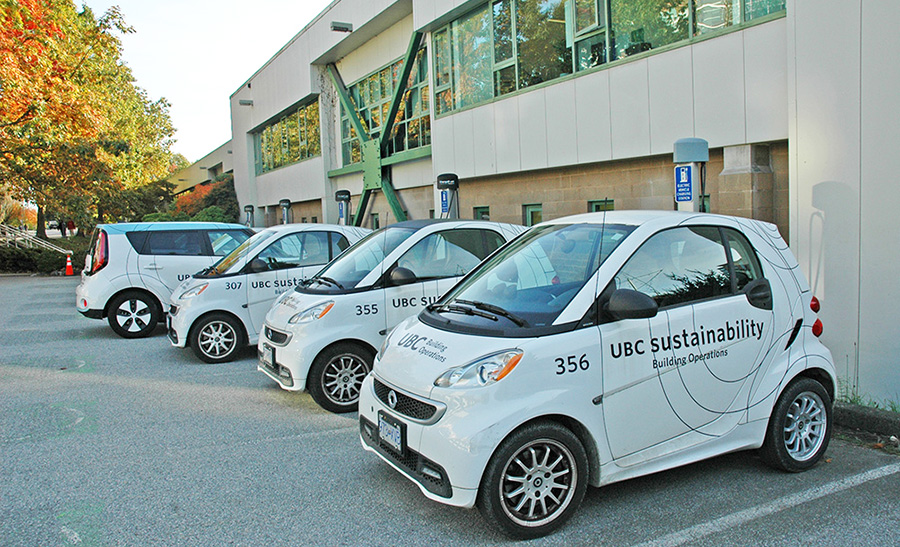
A group of Smart cars plugged into the EV Charging stations at UBC Building Operations.
A number of EV charging stations have been installed to power the university’s electric fleet vehicles. Building Operations operates a number of EV cars and trucks and has 20 EV charging stations to power its fleet. Student Housing and Hospitality Services has a number of EV’s including several Scholars Catering delivery vans.
The switch to electric fleet vehicles is part of UBC’s goal to reduce greenhouse gas emissions to zero by 2050. The use of more electric vehicles reduces not only carbon dioxide emissions but also the gasoline and fossil-fuel powered vehicles on campus. UBC hopes that providing this infrastructure for the community will encourage students, academics, and residents to go electric.
Jose’s tips for EV charging at UBC
- To avoid a ticket, set your phone timer for four hours and move your vehicle from the charging stall.
- Mornings are the busiest time for the EV charging stalls. Consider charging your vehicle in the afternoon.
- Check out the online status of EV charging station availability across campus on the UBC Parking home page: www.parking.ubc.ca